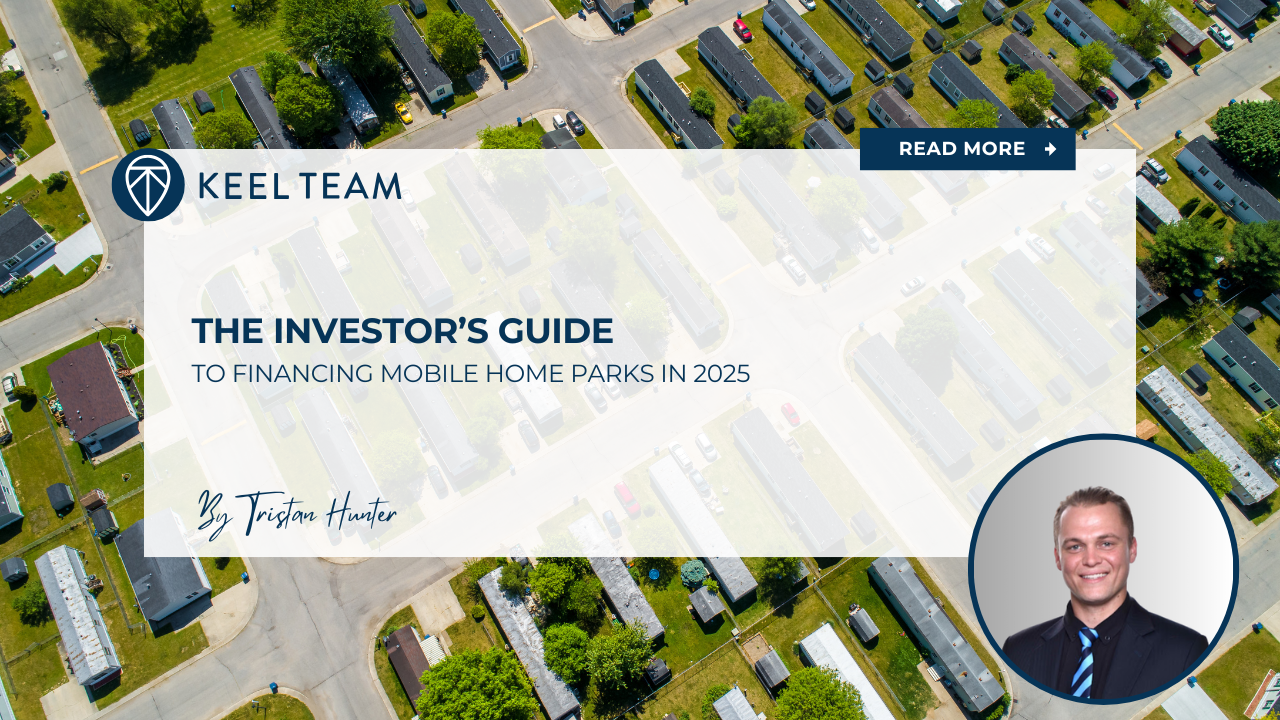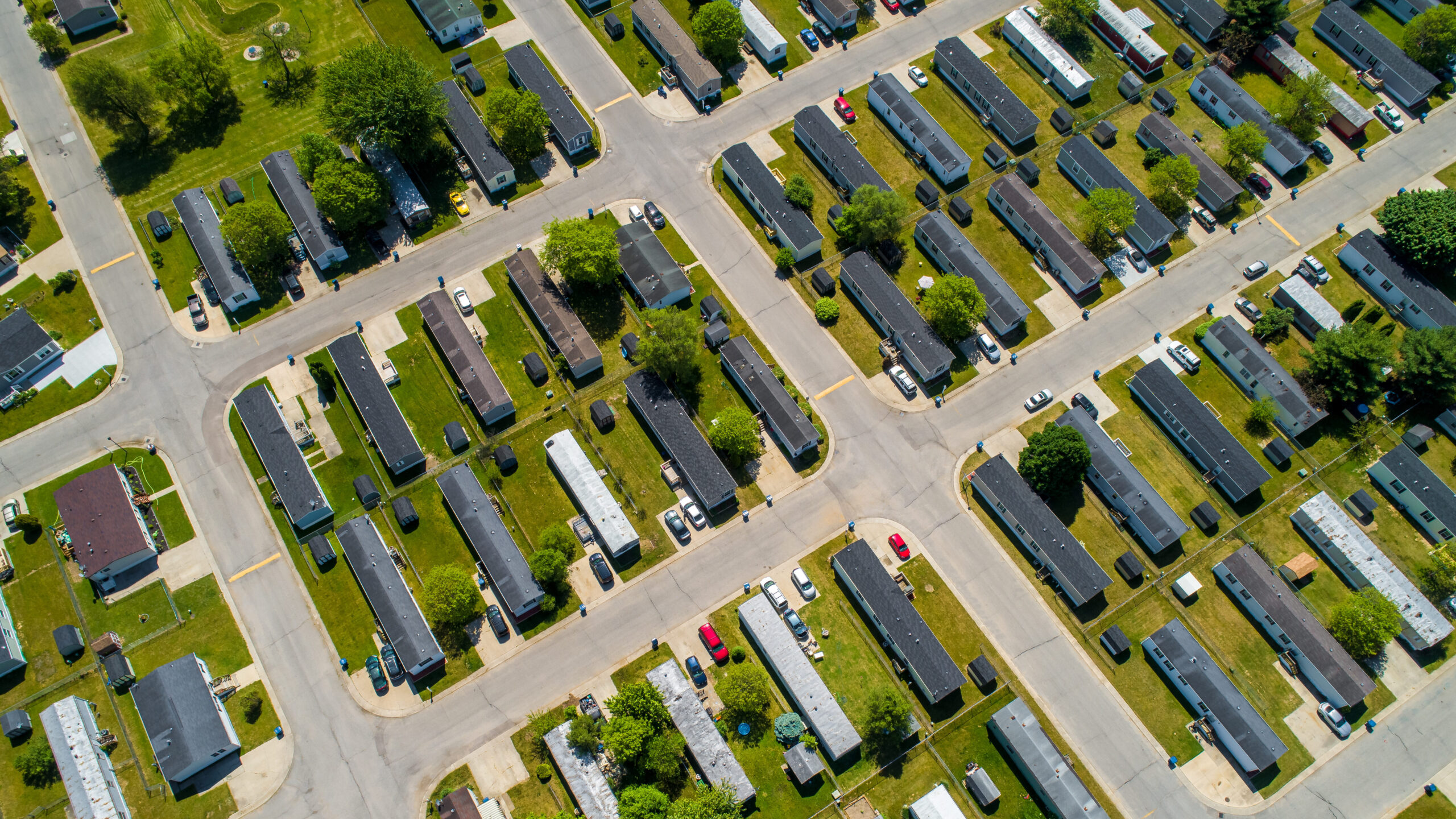The Investor’s Guide to Financing Mobile Home Parks in 2025
-
 Tristan Hunter - Investor Relations
Tristan Hunter - Investor Relations

Investing in mobile home parks can offer steady cash flow and strong returns, but securing financing often poses a challenge. With unique factors like limited comparable sales data and perceived risk, financing mobile home parks requires a strategic approach. This guide explores key financing options for 2025, including seller financing, local bank loans, agency loans from Fannie Mae and Freddie Mac, and creative solutions like Master Lease Agreements. We’ll break down the pros, cons, and typical terms of each, helping you navigate the process with confidence.
Why Invest in Mobile Home Parks?
Mobile home parks provide affordable housing, attracting consistent demand, especially in rural and suburban areas. They often feature low tenant turnover and high occupancy rates, making them appealing for investors seeking stable income. However, financing these properties can be more complex than traditional real estate due to their unique operational and valuation challenges. Understanding your options is key to building a successful investment strategy.
Financing Options for Mobile Home Parks
Below, we dive into the most common financing methods for mobile home parks in 2025, outlining how they work and what to consider.
1. Seller Financing
Seller financing occurs when the mobile home park owner acts as the lender, allowing you to make payments directly to them instead of a bank. This option can be ideal for properties that don’t qualify for traditional loans due to issues like high vacancy rates or deferred maintenance.
Pros:
- Flexible Terms: Sellers may offer lower down payments (as low as 0–10%) and negotiable interest rates.
- No Bank Involvement: Bypasses strict credit checks, appraisals, and loan committees.
- Faster Closing: Streamlines the purchase process, often closing in weeks.
Cons:
- Higher Interest Rates: Rates may range from 5–10%, compared to 4–7% for bank loans.
- Shorter Terms: Typically 3–10 years, which may lead to a balloon payment.
- Risk of Seller Default: If the seller has an existing loan, you could face complications.
Typical Terms:
- Down Payment: 0–10%
- Interest Rate: 5–10%
- Loan Term: 3–10 years
2. Local Bank Loans
Local banks and credit unions often provide loans for mobile home parks, particularly for smaller deals under $1 million. These institutions may offer personalized service and flexibility for local investors.
Pros:
- Competitive Rates: Rates often range from 4–7%, depending on credit and property quality.
- Relationship-Based Lending: Local banks may be more willing to work with new investors.
- Shorter Processing Time: Smaller loans may close faster than agency loans.
Cons:
- Recourse Loans: You may be personally liable if the loan defaults.
- Strict Requirements: Strong credit (620+), 20–30% down payment, and experience may be needed.
Typical Terms:
- Down Payment: 20–30%
- Interest Rate: 4–7%
- Loan Term: 5-15 years
Download our FREE eBook on the Top 20 things to know BEFORE investing in mobile home parks!
3. Agency Loans (Fannie Mae and Freddie Mac)
Fannie Mae and Freddie Mac offer government-backed loans for mobile home parks, providing long-term, non-recourse financing. These loans are ideal for larger, stabilized properties with at least 50 pad sites and 85% occupancy.
Pros:
- Low Rates: Fixed rates often range from 4–6.5%, tied to U.S. Treasury yields.
- Long Terms: Up to 30 years, reducing monthly payments.
- Non-Recourse: Lenders can’t pursue your personal assets in case of default (with “bad boy” carveouts for fraud or mismanagement).
Cons:
- Stringent Eligibility: Requires 50+ pads, 85% occupancy, and no more than 25% park-owned homes.
- Experience Required: At least one sponsor typically needs prior mobile home park experience.
- High Minimum Loan Size: Often $1 million or more.
Typical Terms:
- Down Payment: 20–30%
- Interest Rate: 4–6.5%
- Loan Term: 5–30 years
4. Master Lease Agreements
A Master Lease Agreement allows you to lease the entire mobile home park from the owner with an option to buy at a predetermined price. This creative financing tool suits distressed properties or investors with limited capital.
Pros:
- Low Upfront Costs: Down payments can be minimal or nonexistent.
- No Bank Involvement: Avoids credit checks, appraisals, and loan applications.
- Flexibility: If the property doesn’t perform, you can walk away at the end of the lease term.
Cons:
- Complex Agreements: Requires clear legal terms to avoid disputes.
- No Equity Buildup: You don’t own the property during the lease term.
- Turnaround Risk: Distressed properties may require significant time and effort to stabilize.
Typical Terms:
- Down Payment: 0–5%
- Lease Term: 2–5 years
- Monthly Payment: Flat rate based on negotiation
- Purchase Option: Pre-set price, exercisable during or at the end of the lease
Comparison of Financing Options
To help you choose the best financing method, here’s a table summarizing key factors:
| Financing Option | Down Payment | Interest Rate | Loan Term | Recourse | Best For |
|---|---|---|---|---|---|
| Seller Financing | 0–10% | 5–10% | 3–10 years | Non-recourse | Distressed properties, new investors |
| Local Bank Loans | 20–30% | 4–7% | 5-15 years | Recourse | Smaller deals, local relationships |
| Fannie Mae/Freddie Mac | 20–40% | 4–6.5% | 5–30 years | Non-recourse | Large, stabilized properties |
| Master Lease Agreements | 0–5% | N/A | 2–5 years | N/A | Distressed properties, low capital |
Key Considerations for Financing Success
Before pursuing any financing option, keep these tips in mind to strengthen your application and improve your chances of approval:
- Build a Strong Credit Profile: A credit score of 620 or higher is often required, with 680+ unlocking better rates.
- Demonstrate Liquidity: Lenders may want 9–12 months of principal, interest, taxes, and insurance (PITI) in reserves.
- Show Relevant Experience: If you lack mobile home park experience, consider partnering with a seasoned operator.
- Conduct Thorough Due Diligence: Evaluate the property’s occupancy, condition, and revenue potential to avoid surprises.
- Work with Specialists: Engage loan brokers or advisors familiar with mobile home park financing to navigate complex requirements.

Challenges and Risks
Financing mobile home parks comes with unique hurdles. Lenders may view these properties as riskier due to potential rent control regulations or deferred maintenance. Additionally, mobile home parks with more than 25% park-owned homes may face stricter scrutiny, as tenant-owned homes are seen as more stable. Creative financing like Master Lease Agreements can mitigate some risks but requires careful legal structuring to protect both parties.
The Future of Mobile Home Park Financing in 2025
As demand for affordable housing grows, mobile home parks are likely to remain a strong investment opportunity. Lenders, including Fannie Mae and Freddie Mac, may continue to refine their programs to support this asset class, potentially offering more flexible terms for smaller or rural properties. Staying informed about market trends and building relationships with lenders can position you for success.
Final Thoughts
Financing a mobile home park in 2025 requires careful planning and a clear understanding of your options. Seller financing and Master Lease Agreements can offer flexibility for new investors or distressed properties, while local bank loans and agency loans provide competitive rates for stabilized assets. By weighing the pros, cons, and terms of each method, you can choose the approach that aligns with your goals. Always consult with financial and legal professionals to help ensure your investment strategy is sound.
Are you looking for MORE information? Book a 1-on-1 consultation with Andrew Keel to discuss:
- A mobile home park deal review
- Due diligence questions
- How to raise capital from investors
- Mistakes to avoid, and more!
Disclaimer:
The information provided is for informational purposes only and is not investment advice or a guarantee of any kind. We do not guarantee profitability. Make investment decisions based on your research and consult registered financial and legal professionals. We are not registered financial or legal professionals and do not provide personalized investment recommendations.

Tristan Hunter - Investor Relations
View The Previous or Next Post
Subscribe Below 👇





